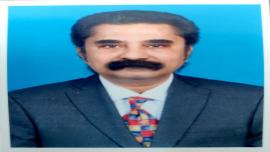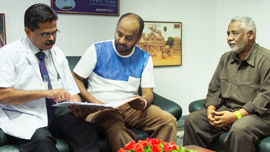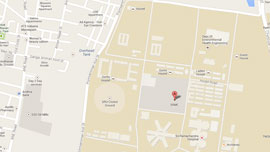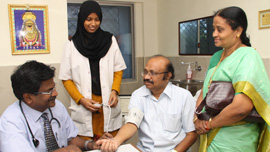Sri Ramachandra Medical Centre
Childhood Asthma
What is Asthma?
It is a chronic disease with episodic symptoms caused by tightening of the airways inside the lungs.
What causes asthma? People with asthma have sensitive airways, which become narrow as a result of some "trigger". This makes breathing difficult. The tendency is known to run in families. Asthma may also occur in children, without any family history of asthma.
What are the main symptoms of asthma? The main symptoms are recurrent attacks of breathlessness, wheeze, cough, tightening of the chest or recurrent pneumonia. All children with asthma do not wheeze.
What can be done to confirm that my child has asthma? Asthma is diagnosed by clinical evaluation. The doctor puts together all the information after listening to you and examining your child. Asthma is episodic, there may be no signs at the time of evaluation by your doctor. Often relief with a trial of bronchodilators helps to confirm the diagnosis.
There is no test, which can diagnose a certain type of asthma. Investigations are done to rule out conditions that may mimic asthma.
What causes asthma attacks? Things that cause asthma attacks are called triggers. Some well-known triggers are mould, dust mites, smoke, cockroaches, cats and dog's fur, air pollution like pollen, certain foods, cold drinks, respiratory infections, emotional upsets, changes in weather and exercise.
Can asthma be cured? Asthma cannot be cured, but can be effectively controlled with medicine. Repeat attacks are common.
Why should inhalers be used for asthma? Asthma medicines are best inhaled rather than taken by mouth or as an injection. Inhaled medicines go straight to the lungs and give quick relief while using very small doses. They also have fewer side effects as very little medicine reaches other parts of the body.
There are different types of inhaler devices for use by children of different ages. Your doctor is the best judge of which device and medicine will work best for your child. The commonest cause of treatment failure is incorrect use of inhalers.
What are the medicines used as inhalers? There are 2 groups of medicines used as asthma-preventers and relievers. Relievers provide immediate relief during an acute attack but only for a short duration (4-6 hrs). They do not prevent recurrence of symptoms. They should be taken only during an acute attack and not on a daily basis.
Preventors are used for certain grades of asthma to prevent frequent recurrence of symptoms but they do not relieve an acute attack. Once started it takes 4 - 8 weeks to note an improvement in the frequency of occurrence of symptoms. It is important to continue to take this medicine even when there are no symptoms to prevent swelling in the airways.
Can medication, have any harmful effect? All medication prescribed for asthma has been tested very carefully for safety. When taken as an inhaled medicine, the dose used is very small and very little reaches other parts of the body and this minimizes the chances of side effects.
What happens if my child's asthma is not adequately controlled? Poorly controlled asthma leads to poor growth, loss of school days, poor quality of life and possible permanent loss in lung function. The shape of the chest may also get permanently deformed.
How does one recognize an acute attack? The symptoms of an acute attack are breathlessness, wheezing, tightness of the chest and coughing.
What should I do when my child has an acute attack? Your doctor will give you an Asthma Action plan. Take the reliever medication as an inhaler as prescribed in your asthma action plan. If this does not help, repeat the inhaler one more time after waiting for the number of minutes recommended by your doctor. If the second try doesn't work, check to see whether the inhaler is empty. It's empty if it floats in a bowl of water. If medicine fails to improve your breathing, you must be treated in the emergency department.
What can I do to prevent my child getting acute attacks?
- Always take your preventer medicine as directed by your doctor. If you feel it is not helping, call your doctor. Also note what is around your child when it occurs.
- Try to avoid pollen, dust, animals, moulds, smoke, and anything else that could cause an attack.
- Keep the amount of dust in your home at a minimum.
- Replace your child's pillows or mattress with materials that don't cause allergies. Look for bedding that is made of 'urethane' or foam rubber and is labelled 'non allergenic'.
- Teach your child to relax since stress and getting emotional can be a trigger.
Should I restrict the physical activities of my child? Absolutely not. It is good to have him exercise daily. It helps make the heart stronger and keeps the child healthy. If the exercise make the child breathless check with your doctor.
Does my child need a special diet? If you notice that a certain type of food brings on an attack, avoid it. It is also a good idea to allow food from the refrigerator to warm up to room temperature before consumption. Otherwise there are no specific restrictions.
Points to remember
- Excess weight can make the heart and lungs work harder. Keep the child's weight in the normal range.
- Keep the medicines and spacers with you wherever you go.
- Gargling after using an inhaler is helpful if there is a burning sensation after use.
- Some medication like Ibuprofen and Aspirin can worsen the symptoms and are better avoided.
- You may also need to avoid tartrazine (yellow food dye #5), which is found in a number of soft drinks, cake mixes and candies.
- Your child is not contagious. That means no one can "catch" asthma from him.
- Asthma has nothing to do with being strong or weak.
- Many world-class athletes have asthma.
- Call doctor at:044-24761549














